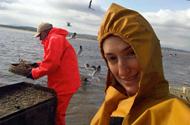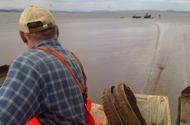Our liaison officer Laura Bates reports on a fascinating trip into Morcambe Bay.
Recently Steve Manning, a fisherman from Flookbourgh, kindly invited me out onto the flooding sand banks of Morecambe Bay for a fishing trip on his 50 year old tractor.
As I donned the yellow oil skins and set out into the vast and ever changing intertidal sand flats, we were accompanied by two of Steve's colleagues, James and Sharon, on another tractor.
As I donned the yellow oil skins and set out into the vast and ever changing intertidal sand flats, we were accompanied by two of Steve's colleagues, James and Sharon, on another tractor.
James and Sharon are expert cocklers, but the cockle fishery has been closed for a few years now.
"The cockle fishery here in Morecambe Bay is a mess; too many licenses and when its open, people line up in their hundreds ready to pick every cockle they see rather than just taking the bigger ones."
Steve's life has always been connected to the sea. He grew up helping his dad catch fish for a living. He then travelled the world with the Navy before returning home to pick up where he left off: fishing.
Steve's tractor pulls a trailer tethered to over 50m of rope and a chassis. The chassis is set at such an angle that when the tractor wades through the edge of the ebbing tide the trailer swings seaward, taking with it two boom nets set either side of the trailer like the pectoral fins of a fish.
With the cockle fishery closed our target for the day is a type of shrimp, the Morecambe Bay Gold.
Continuously tracking the tide we make our first pass along the water for half an hour, after which we pull up on a sand bank and empty the nets into plastic crates. The catch is ‘riddled’ on site and the by-catch (such as crab, the distinctive orange spotted plaice and the dover sole) is returned to the sea unharmed.
The catch amounts to one and a half boxes and so we run another tack and this time catch a further two crates worth. The sun emerges and the muddy sea shines.
Steve's life has always been connected to the sea. He grew up helping his dad catch fish for a living. He then travelled the world with the Navy before returning home to pick up where he left off: fishing.
Steve's tractor pulls a trailer tethered to over 50m of rope and a chassis. The chassis is set at such an angle that when the tractor wades through the edge of the ebbing tide the trailer swings seaward, taking with it two boom nets set either side of the trailer like the pectoral fins of a fish.
With the cockle fishery closed our target for the day is a type of shrimp, the Morecambe Bay Gold.
Continuously tracking the tide we make our first pass along the water for half an hour, after which we pull up on a sand bank and empty the nets into plastic crates. The catch is ‘riddled’ on site and the by-catch (such as crab, the distinctive orange spotted plaice and the dover sole) is returned to the sea unharmed.
The catch amounts to one and a half boxes and so we run another tack and this time catch a further two crates worth. The sun emerges and the muddy sea shines.
The feeling of space was uplifting. Steve caught my smile and said, "It’s a bit different in winter."
We raced back to the small warehouse in good time before the tide cut us off and I silently thanked Steve's ability to navigate this continuously changing bay.
We raced back to the small warehouse in good time before the tide cut us off and I silently thanked Steve's ability to navigate this continuously changing bay.
It’s good to know that Steve supports the work the Irish Sea Conservation Zones project is doing.
"I fully support conservation," he says, "This area is already a special area of conservation, but I want people to realise that you can't map the Bay, it'd be a futile exercise because it'll be different tomorrow."
We process and boil our catch. The smell is mouth watering and I watch the brown shrimp turn a rosie pink.
It’s now Steve's turn to smile. "They're smaller than the shrimps found further north but they taste a whole lot better because they're cooked in their own juice."
We process and boil our catch. The smell is mouth watering and I watch the brown shrimp turn a rosie pink.
It’s now Steve's turn to smile. "They're smaller than the shrimps found further north but they taste a whole lot better because they're cooked in their own juice."
Top photograph Paul Nickson.

 Get Involved
Get Involved








